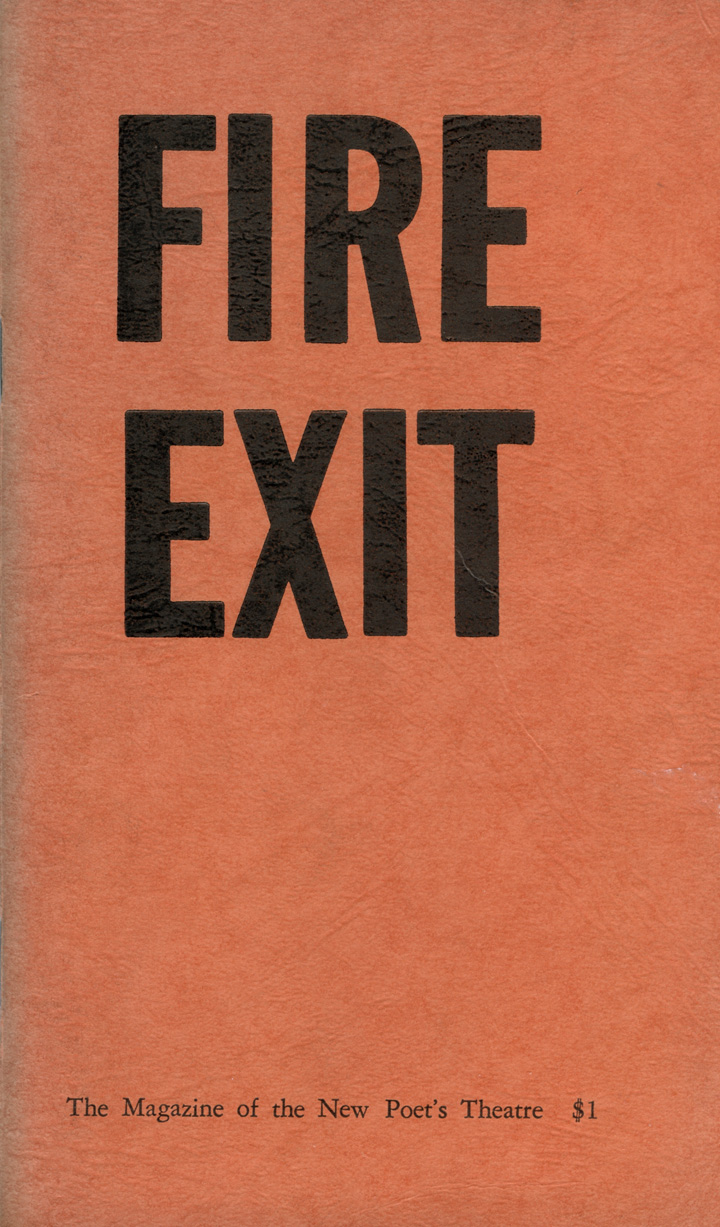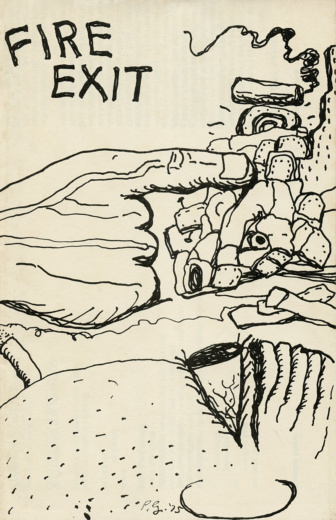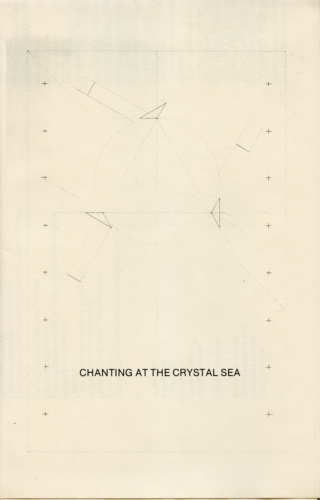Fire Exit
Fanny Howe, Ruth Whitman, William Corbett, and Ben E. Watkins
Boston
Nos. 1–4 (1968–74), plus five unnumbered foldout issues.
Unnumbered foldout issues identified by month only—four were published as April [ca. 1976] and one as July [ca. 1978].
Fanny Howe (1, 2), Ruth Whitman (1, 2), William Corbett (1–4, plus the 5 foldout issues), and Ben E. Watkins (associate editor) (2). No. 3 cover photograph by Rob Brown and back cover drawing by Gerald Coble. No. 4 cover by Robert Nunnelley. Foldout covers by Robert P. Brown, Gerald Coble, Robert Nunnelley, Philip Guston, Ray Kass, and David von Schlegell.
Fire Exit: The Magazine of the New Poet’s Theatre, vol. 1, no. 1 (1968).

Fire Exit began as the magazine of the New Poets’ Theater in Cambridge, Massachusetts, at the behest of Mary Manning, founder of the original Poets’ Theater, playwright, and Fanny Howe’s mother. The magazine took its name from the actress and playwright in the original Poets’ Theater V. R. Lang’s play Fire Exit and its mandate was to publish good writing, poetry or prose. Fanny Howe, Ruth Whitman, and I edited the first issue, the only one affiliated with the Theater; Howe, Ben E. Watkins, and I edited the second issue; and I edited the third and fourth issues, and the five foldout issues that followed. Issues three and four and the foldouts were published at 9 Columbus Square in Boston. The magazines appeared between 1968 and 1974; the foldouts between 1976 and 1978.
The idea for the foldouts came from Philip Guston, who showed me an essay—subject and author lost to history—printed and folded like a map. I adapted this so as to use a signature, not as pages, but as space. Fully open, eight “pages” could accommodate twelve or so pages of text. Front cover for art and back cover for Fire Exit address, contents, price—fifty cents—and room for recipient’s address. A first-class stamp, seven or eight cents, sent it through the mail. Foldouts proved too cumbersome for bookstores.

Fire Exit (April [ca. 1977]). Cover by Philip Guston.
— William Corbett, Brooklyn, January 2017
From Issue No. 3 [1973?]
William Corbett on publishing Fire Exit
Fire Exit has had an unusual life even for a little magazine. Five years ago the first issue appeared as the magazine of the New Poets’ Theater. The New Poets’ Theater, which ran for a year, was a revival of the Poets’ Theater of the early 1950s. I was never certain why the Theater decided to start the magazine. There was talk of publishing plays and theater criticism, but the Theater provided neither of these. Fanny Howe, Ruth Whitman, and myself were asked to be editors, the magazine’s name was taken from V. R. Lang’s remark to the effect that art is life’s fire exit, and the Theater lent $250 toward the cost of the first issue. The $250 was paid back as copies of the magazine were sold at performances of Mary Manning’s adaptation of Finnegans Wake.
Editorially the first issue was a disaster. I think it safe to say that never has a magazine been published with so little evidence of editorial care and subsequently so many howlers. Somehow the editors failed to proofread the final page proofs. Pages were bound out of sequence, almost every page had a misprint and most several, writer’s names were misspelled, and the New Poets’ Theater was spelled four different ways. The night after the magazine appeared I received a telegram over the telephone, the phone waking me at 3 a.m., asking me to note line 5 page 30, line 7 page 30, etc. Most of the writers were irate and justifiably so. For all the editors’ incompetence the first issue held strong work by James Tate, Jim Harrison, and Paul Hannigan, and Ruth Whitman’s Jacob Glatstein translations.
Fire Exit risked a second issue primarily because the editors, now Fanny Howe and myself, sought redemption for the sins of the first and because a chance meeting with an old school friend of mine provided the money to continue. Ben Watkins worked on the second issue as proofreader, and improved the design in every way. He also got most of the words right. In the second issue there was good work by Richard Tillinghast, Ron Loewinsohn, J. D. Reed, and Sam Cornish. Plans were made for a third issue, manuscripts gathered, but there was no money, and the situation did not change for three years.
Late last summer Russell Banks, one of the editors of Lillabulero and at the time a member of the grants board of the Coordinating Council of Little Magazines, asked me if I had enough material for a third issue. He said that the Council had some extra money and advised me to apply for a grant. I consulted Fanny about another issue, but the pressure of a new baby and her own work forced her to leave the magazine in my hands. I made application, and in the fall of last year the Council awarded Fire Exit the $750 that makes this issue possible. I thank Russell for his help, and the Council for its generosity.
In the year I have worked on this issue I have developed a few general principles under which Fire Exit will, money willing. continue with a new and as yet undecided name. I plan to publish this magazine once a year, to print at least one long, more than seven pages, poem an issue, to print blocks of work by those poets and prose writers who interest me, and to publish criticism, long essays or short. I intend to gather the material slowly, and to make the focus of the magazine my own changing tastes and concerns. The magazines of the last twenty years that I admire are Kulchur, Corman’s Origin, Bly’s Fifties-Sixties-Seventies, Hitchcock’s Kayak, Donald Phelps’ For Now, and Banks’ and Matthews’ Lillabulero. That’s the company I would like to keep.

Fire Exit (April [ca. 1978). This whole issue is devoted to publishing Susan Howe’s Chanting at the Crystal Sea.
